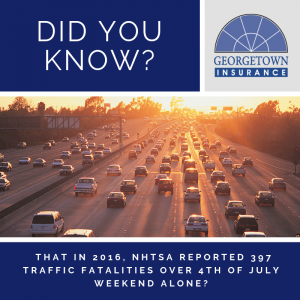
Did you know…
That in 2016, the National Highway Traffic Safety Administration (NHTSA) reported 397 traffic fatalities on Independence Day weekend alone? In fact, 44 percent of all vehicle fatalities that occurred in 2016 happened between the months of May and August, with July being the highest. Medically consulted injuries in motor vehicle incidents totaled 4.6 million in 2017, and total motor vehicle injury costs were estimated to be nearly $433.8 billion. While many motor vehicle crashes are preventable with the proper safety precautions, car accidents remain a top cause of death in the U.S.
With June being National Safety Month, it’s important for people to do their part to reduce potential dangers on the road. And as summertime begins and your vacation plans fall into place, there’s often a long to-do list of things to look over to ensure the safety of you and your passengers, your vehicle, and other drivers. Before heading out to the beach or cross-country, take the time to make sure you and your car are in the proper condition for a long drive:
- Top off your car’s fluids including oil, coolant, brake fluid, etc.
- Check the air pressure in your tires and examine them for wear and tear
- Ensure all your car’s lights and signals are working
- Make sure your car battery is less than five years old and functioning well
- Have an emergency roadside kit that includes jumper cables, a flashlight, batteries, First Aid kit, etc. and ensure it’s all in the proper working condition
Most importantly, before hitting the road and beginning the hours of driving to your summer getaway, make sure you have the proper coverage and insurance for your individual situation. Does your insurance provide damage liability not only for your car, but also for others involved? How about personal liability? Are you and your family covered in case of an accident?
We all look forward to spending time with friends and family, but don’t let the fun and relaxation of a summer vacation distract you from your responsibilities as a driver. If you have questions, contact your insurance agent to get specific details on your insurance plan and what it covers (and doesn’t cover).
Have questions? Contact us to speak with a licensed insurance professional.
